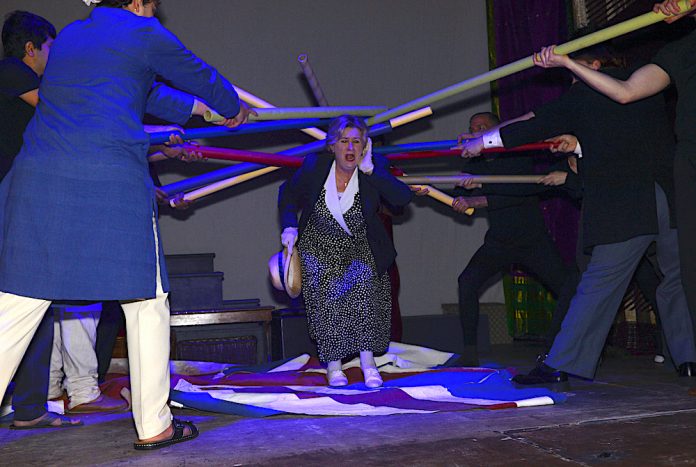A Passage to India
Writer: E.M. Forster adapted by Martin Sherman
Director: Mark G. Nagle
Genesian Theatre
May 15 – June 19, 2021
Bringing Martin Sherman’s adaptation of E.M. Forster’s rich and sprawling novel A Passage to India to the compact stage of the Genesian would have posed many challenges. Apart from a large number of characters and costumes, a diversity of locations, the narrative is in no haste to reach its haunting conclusion. The Genesian has responded admirably by finding creative solutions to the logistic problems and has distilled some of the beauty of the original text into the performance.
Set in the time of the British Raj and the Indian independence movement of the 1920s the story revolves around four characters: Dr Aziz (Atharv Kolhatkar) a Muslim doctor, and Cyril Fielding (Mile Boland) principal of a local college, who are trying to achieve a meaningful relationship between an Indian and a European, and Adela Quested (Christiane New) who has come to India to decide whether or not to marry a member of the British colonial administration, and her potential future mother-in-law, Mrs Moore (Susan Jordan). Both women are eager to experience India rather than the stiff formality of British colonial society.
On a whim Mrs Moore visits a mosque by moonlight and encounters Dr Aziz. Her acceptance of the rules governing entrance to the mosque impresses Aziz and he feels, as does Mrs Moore, the possibility of mutual respect. Kolhatcar is perfect as Aziz, generous and garrulous, an easily moved lover of poetry, and Jordon convinces as the open-minded Mrs Moore whose Christian faith is summed up in “God is love”. While Aziz does not warm to the over-earnest Adela, he nevertheless out of politeness and his warmth of feeling for Mrs Moore offers to organise an expedition to the Marabar Caves to give Adela an experience of “the real India” she craves before she makes a decision about marriage.
The stage set is very simple. Boxes, racks and mats are arranged to suggest various locations indoors and out, and now used to effect to suggest the train leaving the station, Aziz apparently dangling from the side to give a hand to Fielding who is left behind with his companion, the Hindu teacher Godbole (Gaurav Kharbanda). A greater challenge is yet to come in the elephant ride that takes the party to their destination and creatively handled by having several people support a large canvas union jack (a symbol of a lumbering colonial administration?) and the group perched on top.
Both women have frightening but different experiences in the Marabar Caves. Once in the dark cave, Mrs Moore experiences an attack of severe claustrophobia and her panic is dramatically evoked by the heavy sticks that obstruct her attempts to escape. Adela’s belief that she was followed into the cave by someone, whom she later claims is Aziz, and who “touches” her, is skillfully handled and gives the impression perhaps of a hallucinatory experience. The consequence of Aziz’s expedition is that he is accused of assault, and a profoundly confused Mrs Moore leaves for England abandoning both Adela and Aziz whom she knows is innocent.
Such a mess and it is partially resolved when Adela endures the ignominy of admitting she was mistaken in accusing Aziz in court. However, the Indian experience has been a disaster. While New is to be commended for her ability to show change and growth in Adela as a consequence of her suffering, and Boland for his ability to project a kindly decency, the Indian experience is over. Even after years pass the possibility of friendship between Fielding, the colonizer, however guiltless, and Aziz the colonised, however successful, is not possible.
The play opens and ends with Dr Godbole who believes in the unity of the cosmos and the insignificance of individual human suffering. He appears at significant moments, benign and peaceful, rising above the messiness of human passions, teasing his audience with spiritual conundrums. While a minor character, he is central to the sprawling narrative and Kharbanda brings an authenticity to this difficult role.
While long, this adaptation maintained its audience’s interest in the narrative as it is relevant to our own post-colonial hearts and by its evocation of an intriguing Indian world. Through music (tabla player and singer, Aman Pal), authentic and colourful costumes and in particular in the graceful movements of Sweta Kumar we are given glimpses of a dreamy, philosophic beauty.
_______________
theatre@ssh.com.au






